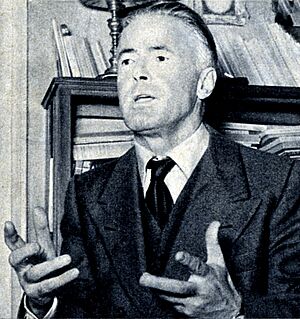Ugo Betti facts for kids
Ugo Betti (born February 4, 1892, in Camerino; died June 9, 1953, in Rome) was an Italian judge. But he is much more famous as a writer! Many people think he was one of the best Italian playwrights, right after Pirandello. A playwright is someone who writes plays for the theater.
Contents
About Ugo Betti's Life
Ugo Betti studied law in Parma. This was around the time World War I started. He chose to join the army as a soldier. After the war ended, he finished his studies. He then became a judge.
Becoming a Writer
Even though he was a judge, Ugo Betti loved to write in his free time. He published his first books of poems in 1922. These poems were called Il re pensieroso (which means The Thoughtful King). He wrote them while he was held captive in Germany from 1917 to 1918.
His first play was called La Padrona. It was performed for the first time in 1927. This play was very successful! Its success made him decide to focus completely on writing plays for the theater. In 1931, he moved from Parma to Rome.
Challenges and Later Years
Ugo Betti faced some challenges in his life. In 1938, some people wrongly accused him of being against the government at the time. After World War II, he was again wrongly accused, but he was found innocent of all charges. In his later years, he worked at a library for the Ministry of Justice.
Ugo Betti's Plays
Ugo Betti wrote 27 plays in total. The plays he wrote later in his life, from 1940 until he died, are considered his best. His plays often explore big ideas. They look at why bad things happen and how people feel guilty. They also explore the idea of making things right again.
Some people call him "the Italian Kafka". This is because his plays often involve a kind of investigation, like a detective story. But these investigations often become about bigger, deeper questions. For example, in his play The Inquiry, it's not always clear what the investigation is truly about.
His most famous play is probably Corruzione al Palazzo di Giustizia. This means Corruption in the Palace of Justice. In this play, an investigation starts about possible corruption among judges. More and more people become involved. Even the person doing the investigation has to think about their own actions.
Ugo Betti's Works
- Il re pensieroso (The Thoughtful King, 1922)
- La Padrona (The Mistress of the House, 1926)
- L'isola meravigliosa (1929)
- Il diluvia (1931)
- Una bella domenica di settembre (1935)
- I nostri sogni (1936)
- Frana allo scalo nord (Landslide at the North Station, 1936)
- Il paese delle vacanze (Summertime, 1937)
- Favola di Natale (1937)
- Il cacciatore di anitre (The Duck Hunter, 1940)
- Il diluvio (The Flood, 1943)
- Spiritismo nell'antica casa (Spirit-Raising in the Old House, 1944)
- Corruzione al Palazzo di Giustizia (Corruption in the Palace of Justice, 1944-1945)
- Delitto all'isola delle capre (Crime on Goat-Island, 1946)
- Ispezione (The Inquiry, 1947)
- Aque turbate (Troubled Waters, 1948)
- La regina e lgli insorti (The Queen and the Rebels, 1949)
- L'aiuola bruciata (The Burnt Flowerbed, 1952)
- La Fuggitiva (The Fugitive, 1953)
Movies Based on His Work
- A Woman Has Fallen (1941)
- The Woman of Sin (1942)
- Yellow Hell (1942)
Ugo Betti's Plays in English
You can find some of Ugo Betti's plays translated into English:
- Three Plays. Edited by Gino Rizzo (New York: Hill and Wang, 1966). This book includes The Inquiry, Goat Island, and The Gambler.
- Three Plays. Translated by Henry Reed. (New York: Grove Press, 1958). This collection has The Queen and the Rebels, Summertime, and The Burnt Flowerbed.
- Three Plays on Justice. Translated by G. H. McWilliam. (San Francisco: Chandler Publishing, 1964). This book includes Landslide, Struggle Till Dawn, and The Fugitive.
See also
 In Spanish: Ugo Betti para niños
In Spanish: Ugo Betti para niños
 | Delilah Pierce |
 | Gordon Parks |
 | Augusta Savage |
 | Charles Ethan Porter |


